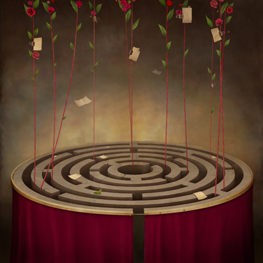How to Get Your Book Written
By “them” I mean the so-called experts who present—in shiny how-to guides and SEO-optimized websites—all the super amazing surefire genius ways to get your book written that never even crossed your mind, because, well, you must not be as smart as they are. By “you,” of course, I mean “me.”
Here’s the thing: These so-called experts who claim to know the three rules and the seven secrets are really selling the three flowcharts and the seven platitudes. They make a living by slinging slogans. I know this because I used to work in marketing. That’s a three-syllable word for sales.
I can spot a sales hook with my eyes closed. What a handy skill to have as I push through the uncertain currents of the scenes and stories I am now dreaming into words. I write in bed, in my mind, before I wake up in the morning. I scribble ideas in the notebook I keep by my bedside. I draft at my computer, while sipping coffee from a big mug and perhaps nibbling raisins. Sometimes I write on the back of grocery receipts, which are like modern scrolls. As I dream and write I am not biting into anyone else’s slogans. I’m not even biting into my own slogans—not swallowing the rules I used to impose on myself, the edicts I tried to make myself obey, and the secrets I’ve been too ashamed to reveal. I’m opening up to my process. I’m letting my process be my guide.
This brings me to the good news: You have lots of ideas about how to proceed, and by tapping your own wisdom, you can create your own plan for developing and completing your book. And by “you,” I mean “you.” Here are three things that might help you to get started and to keep your momentum going. These are flexible, slogan-free suggestions that you can bend into any shape that works for you.
1. Develop a writing practice.
2. Find supportive writing friends and teachers.
3. Let your manuscript and writing process show you the way.
Develop a Writing Practice
There are lots of ways to develop a writing practice. Start by giving yourself time to write. That’s essential. Experiment with exercises and prompts. Try writing from the senses and doing group writing exercises. Try writing to music. Try keeping a log of your process. Use any tools and practices that help you develop a habit of writing.This month almost 300,000 people are using the online program NaNoWriMo to establish a writing practice, and each one has a goal of developing a 50,000-word manuscript in 30 days. It takes much longer than 30 days to write a book, of course, but in this marathon month of writing, many of them will succeed in developing a very rough draft. But perhaps the best benefit of this program is that, by committing to such a rigorous plan, many of them will finish the month with a new habit of writing every day. A month is about how long it takes to develop a new habit.
I know some writers who are using NaNoWriMo to revise their existing manuscripts, which seems like a good use of the program. They have set aside this month to focus on their work. My practice this month is to develop a scene or two every week. So far it’s going well. I’ve generated a lot of new material, and I’m happy with my progress.
Find Supportive Writing Friends and Teachers
Writing friends can help you stay on track with your writing practice, share literary opportunities, and respond to your work.My friend Lisa Rizzo developed a writing practice based on a conversation we had at the Albuquerque airport after the AROHO Retreat. She decided to wake up early every day and write for half an hour before heading out to her job. I wanted to keep the early wake-up time I’d established at AROHO so that I could write before it got noisy in my neighborhood, where building contractors have been hard at work. Lisa and I checked in with each other once a week for a few weeks. She succeeded in developing the new writing practice she’d envisioned. I didn’t have much success getting up early, but I have been writing regularly, which is the whole point. I might need to acknowledge that I’m a night owl.
Earlier this year my friend Tania Pryputniewicz initiated a weekly check-in by email. Once a week she’d send me a list of the things she had done or intended to do. That was a way for her to be accountable to herself. She didn’t expect me to reply, but often I would reply. She inspired me to start my own weekly lists of work completed and work to do.
Other writers I know host writing days and salons at their homes, participate in writing groups, and swap manuscripts for review and feedback. These are all fine ways to be part of a writing community, and being part of a community is essential to writing success.
Sometimes it helps to take a class or to work with an editor or a coach. This year I went to the AROHO Retreat and the Writing by Writers Workshop at Tomales Bay to get inspiration and connect with my writing community. Writing retreats and workshops are great places to meet writers you can cultivate as friends, manuscript reviewers, and accountability partners.
Teaching is another way to connect. I learn so much from my students.
Let Your Manuscript and Process Show You the Way
Writing a book is like getting to know a new friend or getting reacquainted with an old friend. And like any relationship, the book you are writing will change as your understanding of it develops. The language you use to describe people, places, and events will help you go deeper into your story. As you create your manuscript you’ll discover new ideas and explore new ways to convey your meaning. You’ll establish some goals and deadlines, consult your writing friends, and give yourself permission to play. Bit by bit, you’ll complete your book.No one else can answer the question “How do I get my book written?” because throughout the process of writing that question will morph into dozens of questions, such as “What’s the best way to approach this scene? How can I describe this person? What is the meaning of this event? Will I have more success writing by hand or on the computer? Why is it important for me to tell this story?” Questions of technique, process, format, and intention will change as the manuscript grows, and the writing itself will offer clues on how to proceed.
You simply have to write when you can, find the friends and teachers who will help you, and listen to your own wisdom. There’s no timeline. There’s just the process.
Happy writing!






Good stuff you got here Aunt Barb.
I am still working on developing a writing practice, (along with a meditation practice, a singing practice, and an exercise practice.)
Mornings are not great for me either. I want to sleep in as long as I can.
And I also thought that receipt paper was like scrolls. I used to do a bit of cashiering (waitressing, the malls!) and sometimes we would take the roll out early. So it wouldn’t run out in the middle of a rush. I didnt want to throw it away and so I would write on the back of them and then roll them back up.
I don’t think there was anything special or grand written, but it was fun. 😉
Hi, Nara. Try developing one practice at a time or maybe writing one day, exercising the next, meditating before writing, singing all the time, and jotting notes on the back of receipts forever! You’re a fine artist, so do whatever works to keep your creativity flowing.
O.k., They say there’s a zen-y time for everything, but this is uncanny. This is the debate that has been going through my head for the past week. Honestly. Plus I brought these woes to dinner last night with two writer friends. As I dither between commercial and small press for my book, I especially like the concept of letting the manuscript show you the way and asking ourselves why we must tell this story. I think your post supplied the answer for me, Barbara. Bless you. : )
Aine, you are a fantastic writer and your book wants to be written! I’m so glad you found an answer in this post. I’ve been enjoying your posts at http://www.ainegreaney.com/
Barbara,
Thank you for mentioning me in your post! Today was my 89th day of writing practice. when we sat in the Albuquerque airport, I never thought I could keep this up. I think making that pact with you was the turning point. I think it just shows how important it is that we find people to support us in our writing. You have become such a support for me! Keep up your own practice. We both can do it!
Lisa, I’m so glad that you are sticking with your daily writing practice, and proud of you too! Making that pact with you helped me strengthen my commitment to writing, and that’s one reason I’m taking a little break from blogging. Thanks for your support! We can do it!
Amazingly simple, practical and encouraging advice! It’s hard to start – and stick with — a writing practice but that’s the bottom line (for me). And I heartily — and rowdily — endorse the support group. Now to find someone to invite me to a day salon …
Thanks, Sandra! You’re my model for stick-to-it-ive-ness (http://www.strikingly.com/sandrahunter#all-those-words)! Congrats on your upcoming novel, Losing Touch. Can’t wait to read it!